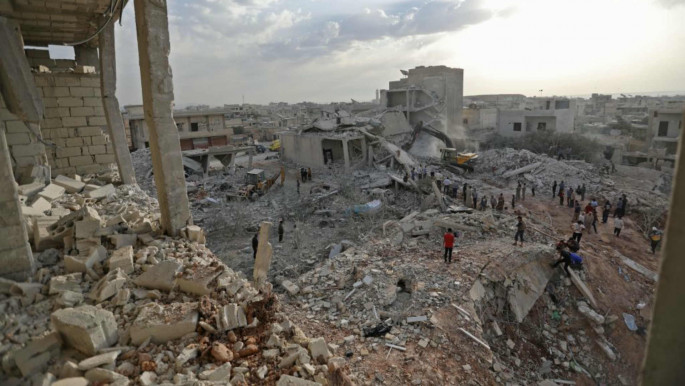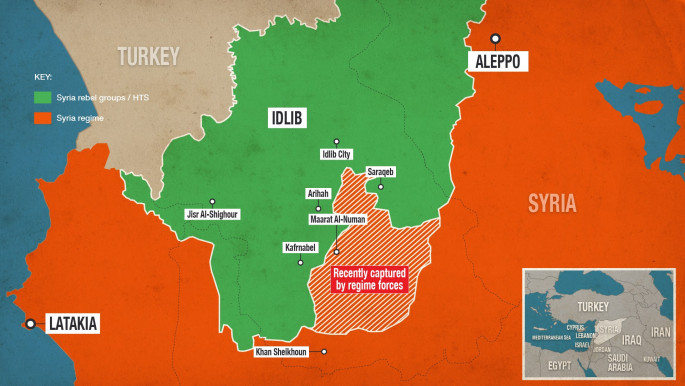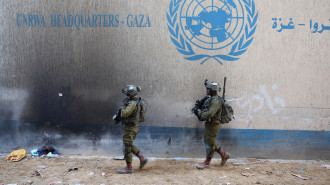As Syria regime inches closer, Idlib city prepares for mass exodus of civilians
Fahad Aswad hasn't slept in two days. An anaesthetist at a maternity and paediatric hospital in Idlib city, Aswad has been working around-the-clock to treat patients injured in the mounting violence that's gripped Syria's last rebel stronghold.
"As I talk to you, the sound of warplanes fills the air," Aswad told The New Arab over WhatsApp.
The Syrian army has advanced to within eight kilometres of Idlib city, the heavily populated provincial capital home to scores of civilians already uprooted from fighting elsewhere in the country. But even as pro-government forces inch closer to the city, Aswad is determined to stay put.
"We will continue to work until our last breath. If Bashar al-Assad's forces decide to storm the city, we will be displaced to the camps," he said.
In what amounts to one of the largest displacements since Syria's war erupted in 2011, a deadly regime offensive in northwest Syria has forced more than half a million people to flee their homes since December, the United Nations estimates.
Videos posted to social media showed bumper-to-bumper traffic as thousands poured out of Idlib city and the surrounding towns this week.
 |
|
| Read also: Idlib: A Syrian tragedy foretold |
Desperate families packed their cars and trucks to the brim and headed north toward the relative safety of towns near the locked Turkish border.
The civilian exodus began in late April when the government launched its push to retake Idlib and parts of neighbouring Aleppo and Hama provinces – the last swath of the country still in the hands of the opposition.
According to the UN human rights agency, at least 1,500 civilians have been killed in the past nine months of fighting.
President Bashar al-Assad, whose forces now control roughly two-thirds of the country, has long vowed to capture every inch of Syria.
 |
Bashar al-Assad, whose forces now control roughly two-thirds of the country, has long vowed to capture every inch of Syria |  |
Supported by Russian airpower and Iran-backed militia forces on the ground, the Syrian army has retaken several key towns and villages in the past two months, including the opposition stronghold of Maaret al-Numan.
Under the cover of airstrikes, Syrian forces seized parts of the major highway town of Saraqeb on Thursday, some 15 kilometres east of Idlib city, according to the UK-based Syrian Observatory for Human Rights.
"They are trying to advance from several axes in southern Idlib and Aleppo countryside," said Captain Naji Mustafa, spokesperson for the Turkey-backed National Liberation Front.
"[The regime] suffered heavy losses, but Russia is using all of its military power and practicing a scorched-earth policy," he said.
 |
|
Turkey, which backs the opposition, called for an end to the bombing campaign after shelling by Syrian forces killed eight of its military personnel.
Turkish President Recip Tayipp Erdogan warned his country would not allow Syrian forces to advance further and accused them of pushing "innocent and grieving people" toward Turkey's southern border, which is currently closed to new refugee arrivals.
He added that Turkey would retaliate if pro-government forces did not retreat from Turkey's 12 observation posts in Idlib, two of which have been encircled by Syrian troops and were set up as part of a 2017 agreement with Russia designed to de-escalate the fighting.
With an estimated 150,000 people displaced in the past two weeks alone, aid agencies are warning of a potential humanitarian catastrophe unlike anything seen in the past nine years of war.
The UN has appealed for $336 million to assist with the latest wave of displaced people, 80 percent of whom it says are women and children.
Freezing winter temperatures and rising fuel costs have compounded an already miserable situation for Syrians on the move.
 |
Freezing winter temperatures and rising fuel costs have compounded an already miserable situation for Syrians on the move |  |
With skyrocketing rental prices for houses in the towns along the Turkish border, many of the displaced have resorted to sleeping in the open air or makeshift tents. Some have found space in crowded displacement camps, which are currently hosting five times their intended capacity.
"Living in camps would be very difficult. As a woman, I cannot imagine," said Afaf Jakmour, a 29-year-old journalist living in Idlib city.
If the regime gets much closer to her home, Jakmour and her family plan to drive north toward the border and from there look for shelter. It's a painful decision Jakmour says she's putting off as long as possible.
"If the regime storms the area, I will definitely leave. But I plan to stay until the last minute," she said.
Elizabeth Hagedorn is a freelance journalist focusing on migration and conflict with bylines in The Guardian, Middle East Eye and Public Radio International.
Follow her on Twitter: @ElizHagedorn

![Palestinians mourned the victims of an Israeli strike on Deir al-Balah [Getty]](/sites/default/files/styles/image_684x385/public/2024-11/GettyImages-2182362043.jpg?h=199d8c1f&itok=xSHZFbmc)


![The law could be enforced against teachers without prior notice [Getty]](/sites/default/files/styles/image_684x385/public/2178740715.jpeg?h=a5f2f23a&itok=hnqrCS4x)
 Follow the Middle East's top stories in English at The New Arab on Google News
Follow the Middle East's top stories in English at The New Arab on Google News


